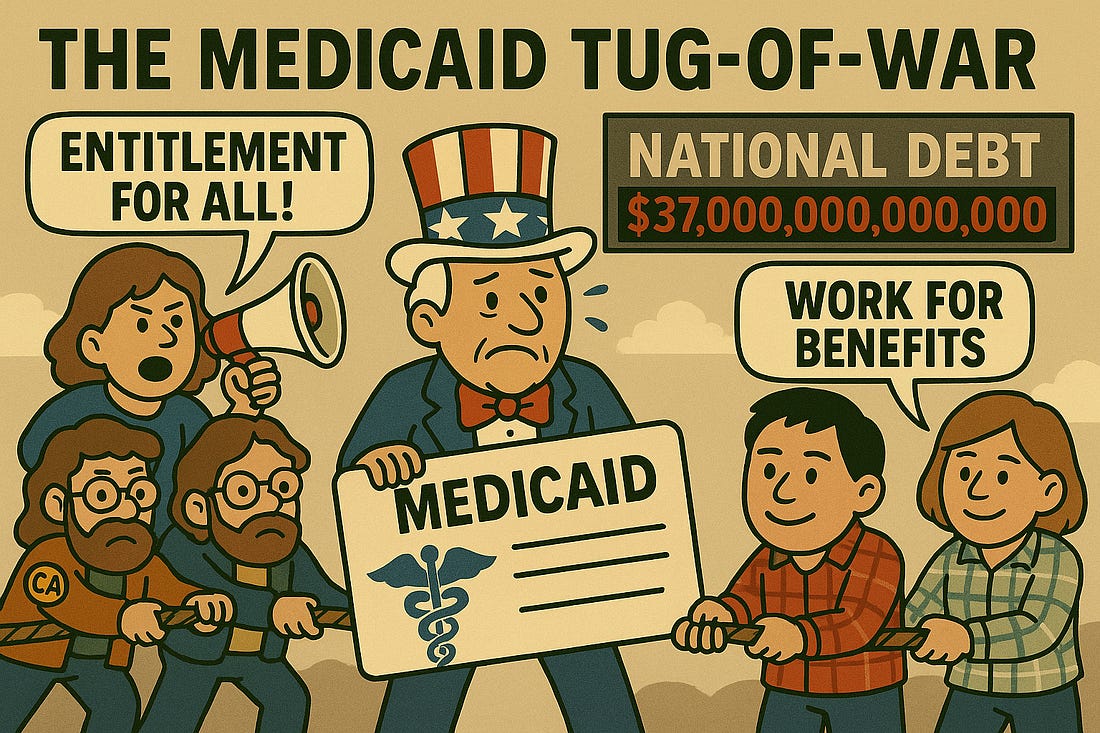|
 |
The question is pretty simple… So, does it matter?
To Preserve American Values, Obamacare's Overreaching Welfare Must End
Proposed Medicaid work requirements expose a deeper divide in government-funded healthcare.
I have watched the recent Medicaid debate unfold with a mix of frustration and clarity. A recent CalMatters article highlights that the House-passed “One Big Beautiful Bill” proposes work requirements for Medicaid, and they go on to show projections that 1.2 to 1.4 million Californians could lose coverage. The article highlights the human cost—poorly compensated workers, such as housekeepers and gardeners, struggling to verify 80 hours of work or study per month. It is a compassionate position, but it sidesteps the real issue: is healthcare a universal right or a safety net for those who require it?
Ten years ago, every Democrat in Congress voted for the Affordable Care Act (ACA), or "Obamacare," that extended government-subsidized care to millions. Only one Republican voted in favor of it. Republicans currently lack the necessary numbers to repeal the ACA outright, so they're attempting to create work requirements as a compromise. Eighty hours of work or school per month isn't harsh—it's modest. Most private-sector employers do not offer health coverage for part-time work, so why should Medicaid? This isn't about shaming people experiencing poverty; it's about linking benefits to responsibility.
The CalMatters article cites the Urban Institute, warning that a third of California Medicaid recipients will lose coverage due to administrative burdens. It vividly illustrates workers without pay stubs—such as construction laborers and freelancers—enmeshed in bureaucratic hurdles. But it barely mentions the fiscal elephant in the room: our $37 trillion national debt and multi-trillion-dollar deficit. Every dollar spent on "free" care today is borrowed and will accrue interest for our heirs. The article's focus on losses of coverage sounds like a deliberate refusal to confront this unpleasant reality—a method too standard in MSM, which tends to be left-leaning at best.
Democrats view healthcare as a fundamental human right, advocating for government-subsidized coverage for all. Republicans view it as a safety net, not an entitlement. The ACA's expansion blurred the line, stretching Medicaid into a program that now covers almost 15 million Californians on its own. Work requirements are a sensible middle ground—ensuring aid goes to those working to give back, not just those with their hands out. Critics scream "unfair," but fairness is not giving something for nothing; it is ensuring taxpayers are not overwhelmed by runaway spending.
The CalMatters piece spotlights healthcare providers who lose revenue and local economies crashing. What about the broader economic damage of unrestrained debt, though? The Congressional Budget Office estimates that the federal savings would be $100 billion by reducing enrollment. That's not cruelty—it is economic sense. Media focus on sob stories over fiscal reality attests to a bias infecting the conversation. We can't continue playing make-believe that unlimited entitlements are an option. Work requirements aren't ideal, but they're a step in the direction of reconciling compassion with responsibility. Our children deserve a future not weighed down by debt.
The topic under discussion is the role of government in our society. And whether a country like America, founded on the core principles of individual liberty paired with personal responsibility, should adopt a more European-style socialist model with high tax rates and significant wealth redistribution.
Post-script on “Non-Profit Newsrooms” like the CalMatters website.
It is worth mentioning that CalMatters.org is listed at the top of their website as “Nonprofit & Nonpartisan News.” Okay. And they post elsewhere that they take seven-figure contributions from non-profits like the California Healthcare Foundation and the California Wellness Foundation. These groups take extremely progressive positions on healthcare issues and advocate for policy positions that would require increased taxpayer investment in healthcare. I bring this up because it is disconcerting. I recently read an article on healthcare on the site, and at the bottom of the article, there was even a promotional blurb and a link back to a progressive foundation’s website. I think CalMatters does some great work. However, I think they should especially try to balance their coverage when they accept funds from groups with obvious biases.
So, Does It Matter? - with Jon Fleischman is free today. But if you enjoyed this post, you can tell Jon that his writing is valuable by pledging a future subscription. You won't be charged unless he enables payments.
